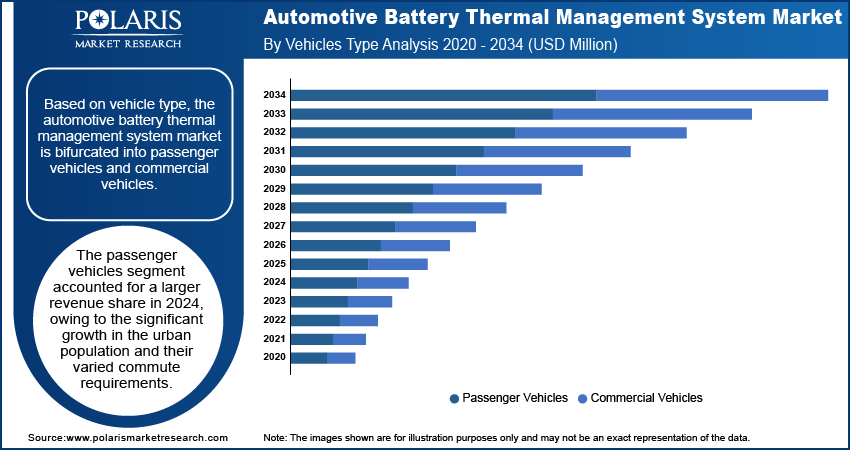Automotive Battery Thermal Management System market expected to grow to USD 15.27 billion by 2034, at a CAGR of 14.6%.

The global automotive battery thermal management system market was valued at USD 3,350.57 million in 2024 and is expected to grow from USD 3,894.70 million in 2025 to USD 15,265.63 million by 2034, registering a compound annual growth rate (CAGR) of 14.6% during the forecast period from 2025 to 2034.
Trends & Insights (4 Key Points):
- Rising Adoption of EVs: The rapid expansion of the electric vehicle (EV) market is driving demand for efficient battery thermal management systems (BTMS) to ensure battery longevity, safety, and optimal performance.
- Technological Advancements: Innovations in phase-change materials, liquid cooling systems, and advanced thermal interface materials are enhancing the effectiveness of BTMS, making them more compact and energy-efficient.
- Focus on Battery Safety & Performance: With growing concerns over battery overheating and thermal runaway, automakers are prioritizing robust thermal management to meet strict safety standards and improve vehicle reliability.
- Integration with Smart Systems: The integration of BTMS with connected vehicle technologies and battery management systems (BMS) enables real-time monitoring, predictive maintenance, and improved energy efficiency.
Market Size & Forecast
- Market Size Value in 2025: USD 3,894.70 million
- Revenue Forecast by 2034: USD 15,265.63 million
- CAGR (2025–2034): 14.6%
𝐆𝐞𝐭 𝐄𝐱𝐜𝐥𝐮𝐬𝐢𝐯𝐞 𝐒𝐚𝐦𝐩𝐥𝐞 𝐏𝐚𝐠𝐞𝐬 𝐨𝐟 𝐓𝐡𝐢𝐬 𝐑𝐞𝐩𝐨𝐫𝐭:
Market Overview
The automotive battery thermal management system market is evolving rapidly, underpinned by the global shift toward electric mobility and stringent emission regulations. As automakers scale up EV production, maintaining battery health through efficient thermal regulation has become critical. BTMS ensures optimal battery temperature, improving vehicle range, safety, and battery life—key factors for consumer acceptance of electric vehicles.
Furthermore, the rise in government subsidies and investments in EV infrastructure globally is propelling technological innovation in battery systems. The demand for fast-charging capabilities and high-density batteries is also necessitating advanced thermal management solutions, positioning BTMS as an indispensable component in modern electric mobility.




![Resilient Flooring Market Analysis: Opportunities, Innovations, and Growth Potential Through [2025-2034]](https://beeswire.com/wp-content/uploads/2025/07/polaris-73-768x768.png)

